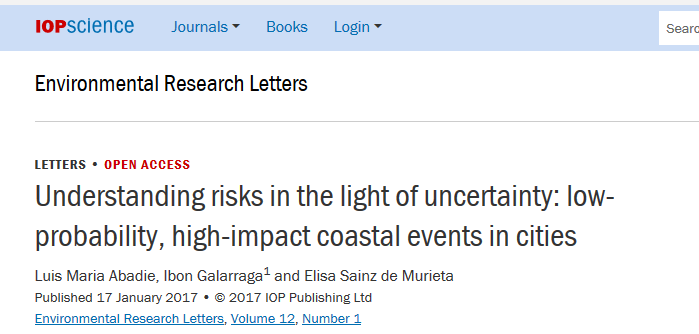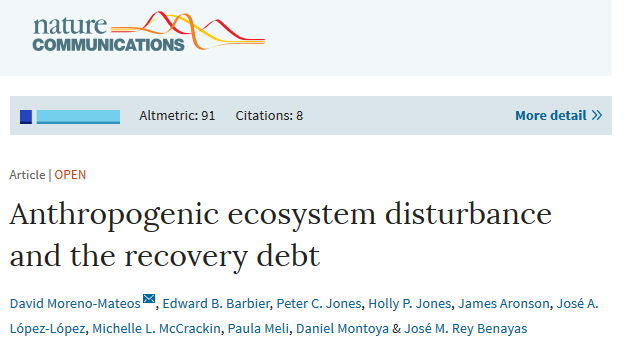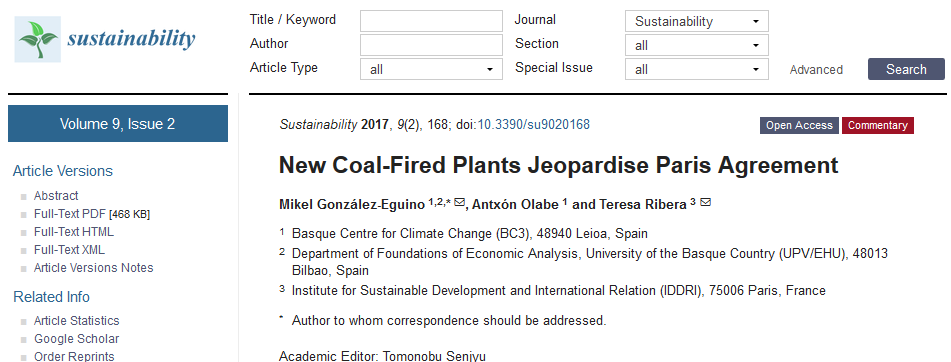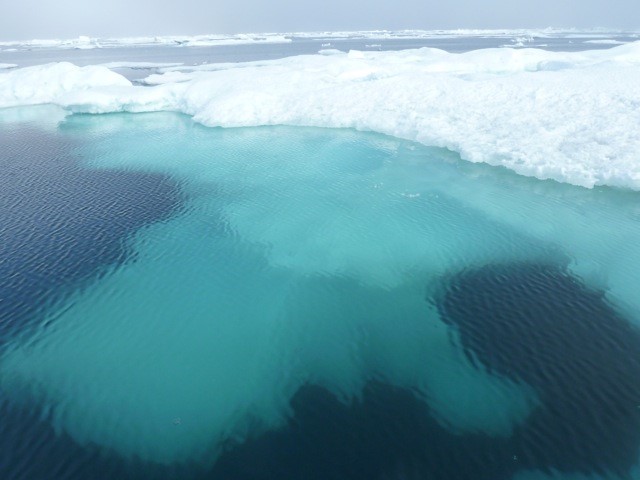Noticias
February 20, 2017
Published by BC3Research at February 20, 2017
Categories
This study presents a new method for considering the risk of wind damage in forest planning and for predicting the amount of damage and its effects on timber production, economic profitability and carbon balance of forestry. The effects of wind damage on the optimal management of boreal forests under current and changing climatic conditions were analyzed by comparing four forest management plans. A reference plan maximized net present value (NPV) with even-flow harvesting constraints.
February 13, 2017
Published by BC3Research Stefano Balbi at February 13, 2017
Categories
Tourism is one of the prime manifestations of the ‘great acceleration of humankind’ since the Anthropocene started around 1950. The almost 50-fold increase in international tourism arrivals has substantial implications for environmental sustainability, but these have not yet been fully explored. This paper argues that a full exploration requires the study of tourism as a complex socio-ecological system. Such approach integrates environmental processes and stakeholder behaviour and puts feedbacks in the spotlight.
February 3, 2017
Published by BC3Research David Moreno at February 3, 2017
New BC3 Journal Article published: "Meli P., Holl K.D., Benayas J.M.R., Jones H.P., Jones P.C., Montoya D., Mateos D.M. 2017. A global review of past land use, climate, and active vs. passive restoration effects on forest recovery. PLoS One. e0171368."
January 30, 2017
Published by BC3Research Luis Mª Abadie Ibon Galarraga Elisa Sainz de Murieta at January 30, 2017
Categories
A quantification of present and future mean annual losses due to extreme coastal events can be crucial for adequate decision making on adaptation to climate change in coastal areas around the globe. However, this approach is limited when uncertainty needs to be accounted for. In this paper, we assess coastal flood risk from sea-level rise and extreme events in 120 major cities around the world using an alternative stochastic approach that accounts for uncertainty.
January 30, 2017
Published by Maria Jose Sanz BC3Research at January 30, 2017
New BC3 Journal Article published: "Haeni, M., et al. (2017), Winter respiratory C losses provide explanatory power for net ecosystem productivity, J. Geophys. Res. Biogeosci., 122, 243–260"
January 30, 2017
Published by BC3Research Eneko Garmendia at January 30, 2017
Categories
Monetary valuation of the environment is increasingly embedded in policy. Despite broad claims that valuation is policy-relevant, there is widespread frustration that it has not widely improved environmental outcomes, that it obscures many other types of values, and presents unintended consequences. We argue that this is, in part, because of a tendency to overlook the mechanics of how valuation tools and data are embedded into the institutions (regulations, norms, rules, schemes) that mediate decision-making.
January 27, 2017
Published by BC3Research David Moreno at January 27, 2017
Categories
Ecosystem recovery from anthropogenic disturbances, either without human intervention or assisted by ecological restoration, is increasingly occurring worldwide. As ecosystems progress through recovery, it is important to estimate any resulting deficit in biodiversity and functions. Here we use data from 3,035 sampling plots worldwide, to quantify the interim reduction of biodiversity and functions occurring during the recovery process (that is, the ‘recovery debt’). Compared with reference levels, recovering ecosystems run annual deficits of 46–51% for organism abundance, 27–33% for species diversity, 32–42% for carbon cycling and 31–41% for nitrogen cycling.
January 26, 2017
Published by BC3Research at January 26, 2017
Categories
Video reportaje sobre BC3 producido y emitido por el Programa LAB24 de TVE 24 hs el 24 de Enero de 2017.
January 26, 2017
Published by BC3Research Mikel González-Eguino at January 26, 2017
Global greenhouse gas emissions need to peak soon and be reduced practically to zero in the second half of this century in order to not exceed the climate targets adopted in the Paris Agreement. However, there are currently numerous coal-fired power stations around the world at different stages of construction and planning that could be completed in the next decade. If all these plants are actually built, their expected future emissions will make it very difficult to reach these targets, even in an optimistic scenario with the deployment of carbon capture and storage technologies. Policy makers around the world need to react quickly and help to redirect investment plans for new coal-fired power stations towards low-carbon technologies
January 19, 2017
Published by BC3Research Marc Neumann Mikel González-Eguino Iñaki Arto Sérgio H. Faria at January 19, 2017
Categories
"Un verano sin hielo en el océano Ártico puede poner en riesgo los objetivos del Acuerdo de París".
Un verano sin hielo en el océano Ártico puede poner en riesgo los objetivos del Acuerdo de ParísUn nuevo estudio muestra que la tendencia actual de derretimiento del hielo marino en el océano Ártico podría poner en peligro los objetivos del Acuerdo de París para hacer frente al cambio climático.
Los autores del estudio concluyen que, debido a la futura reducción del albedo asociada al derretimiento del hielo marino, las emisiones globales de dióxido de carbono tendrían que reducirse a cero entre 5 y 15 años antes de lo previsto para poder alcanzar los objetivos establecidos por el acuerdo. También muestran que el objetivo de limitar el aumento de las temperaturas globales a 1.5 grados Celsius establecido por el Acuerdo de París sería inalcanzable sin emisiones de carbono “negativas”.








